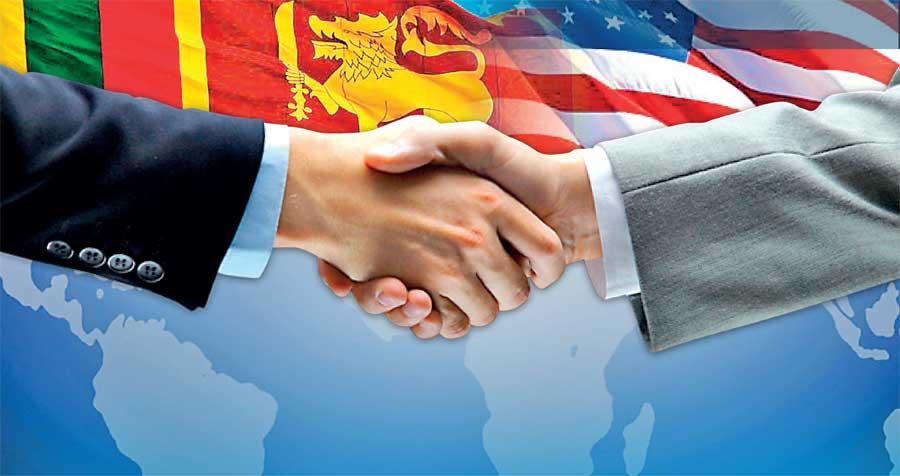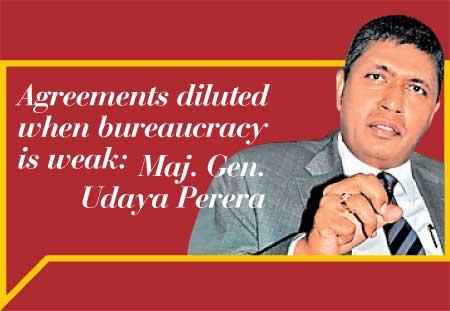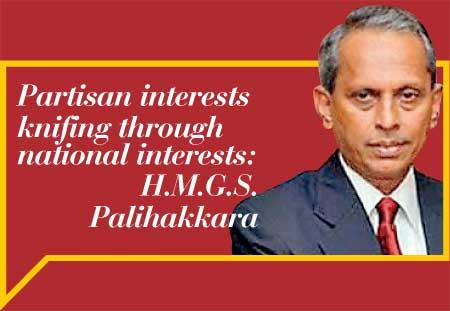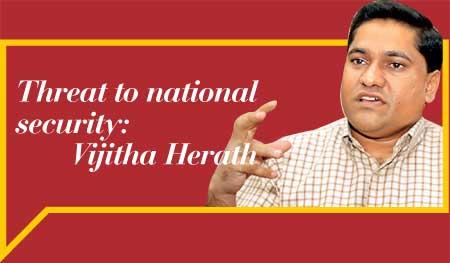Reply To:
Name - Reply Comment
Last Updated : 2024-04-27 04:40:00

- SL a confused nation because it lacks policy and structure
- We can’t create deterrence with foot soldiers
- Conundrum is because we don’t have either a foreign or defence policy
- Govt. toiling to defend HR record rather than defending human rights of its citizens
Ever since the dastardly Easter Sunday attacks, Sri Lanka’s political landscape has clasped the hot seat. Adding insult to injury is the government’s contemplation of inking the amended Status of Forces Agreement (SOFA) with the US. The treaty has made its way at a time when Sri Lanka has crumbled to vulnerability in terms of national economy, geopolitics and  security. Several amended clauses include providing immunity for US soldiers, Americans not being liable to taxes as well as free mobility of vehicles operated by the US Department of Defence within Lankan territory. The agreement surfaces at a time when the Islamic State (IS) is gradually making its way towards the Asia-Pacific region which in turn would be a threat to America’s military pivot in the locality.
security. Several amended clauses include providing immunity for US soldiers, Americans not being liable to taxes as well as free mobility of vehicles operated by the US Department of Defence within Lankan territory. The agreement surfaces at a time when the Islamic State (IS) is gradually making its way towards the Asia-Pacific region which in turn would be a threat to America’s military pivot in the locality.
Against this backdrop, Daily Mirror spoke to several parties to shed light upon how the amended agreement could be an obstacle to national sovereignty and security.
SOFA was initially signed in 1995 under the then President Chandrika Bandaranaike Kumaratunga during which Sri Lanka maintained cordial relations with India, Russia, China and the US. The treaty had carried an immunity clause but such provision can no longer be supported as Sri Lanka enacted the Diplomatic Privileges Act No. 9 of 1996. With the revelation of the draft agreement, the political spectrum was heated up as many factions debated on how it would affect national sovereignty. The Prime Minister’s office recently ascertained the government would not ink the agreement though the US Ambassador to Sri Lanka Alaina Teplitz mentioned negotiations were underway. In several public statements, she said SOFA -- referred to as the ‘Visiting Forces Agreement’ -- would allow the US troops to tour the country and engage in combined military operations. While giving immunity to the US soldiers, it has also been divulged that the amended agreement covers contractors.
 “Alliances are required in the present context,” said Major General Udaya Perera, former Director Operations of Sri Lanka Army and ex-Security Forces Commander in Kilinochchi and Jaffna. “To what extent or which clauses the agreement has to incorporate need to be decided by the two countries. Everything depends on the country’s interest and how its values could be safeguarded. This conundrum is because we don’t have either a foreign or defence policy. When you don’t have policies, lower-level officials and higher-level leaders remain confused as to where the country should be heading to. As far as security is concerned, no country can defend itself, even the US. With a 21 trillion economy and even after spending billions on defence, it still needs alliances.”
“Alliances are required in the present context,” said Major General Udaya Perera, former Director Operations of Sri Lanka Army and ex-Security Forces Commander in Kilinochchi and Jaffna. “To what extent or which clauses the agreement has to incorporate need to be decided by the two countries. Everything depends on the country’s interest and how its values could be safeguarded. This conundrum is because we don’t have either a foreign or defence policy. When you don’t have policies, lower-level officials and higher-level leaders remain confused as to where the country should be heading to. As far as security is concerned, no country can defend itself, even the US. With a 21 trillion economy and even after spending billions on defence, it still needs alliances.”
"It wants to defeat the threat at the farthest end. This is why it went to Afghanistan and Vietnam. It is known as the homeland security concept. It doesn’t wait until the threat comes to its border"
“Why it seeks alliances is because it wants to maintain deterrence and safeguard itself by expanding its presence,” he opined. “It wants to defeat the threat at the farthest end. This is why it went to Afghanistan and Vietnam. It is known as the homeland security concept. It doesn’t wait until the threat comes to its border. As much as the US needs alliances, other countries need alliances with the US. We tend to feel vulnerable because we nestle in a strategic location. Other countries may want to use our location. The problem is our economy. We don’t have the means to protect our vulnerable nation. In order to safeguard our country, we need a well-equipped military; Army, Navy and Air Force. The basis of national security is deterrence and we can’t create it with foot soldiers.”
On a different note, he said agreements were diluted when bureaucracy was weak. “The US isn’t at fault here because it is looking for its interest. So why can’t we look at ours? At this crucial point, we need support from the United States. Every agreement will have pros and cons. Having professional militaries across the world will help the region. If you’re going to have a clause that will impinge our security, and if you’re going to have a clause which results in diluting our sovereignty, interests or values, then it’s our own fault. The reason why we are a  confused nation is because we don’t have a policy and structure. Policy and structure go hand-in-hand. One failure I see in our defence structure is that we don’t have wise defence and security advisors.”
confused nation is because we don’t have a policy and structure. Policy and structure go hand-in-hand. One failure I see in our defence structure is that we don’t have wise defence and security advisors.”
“We must also understand that the US will not come here antagonising India,” he said. “India is a key player in international affairs. It’s a democracy. We can be an independent country but when we enter into an agreement, we have to always look at India and see how it will feel. We have to look at the impact on India’s security if we enter into an agreement with another country.”
"As the complexity of regional geopolitics grows along with the potential for conflict with existing and rising powers or others, so too will be defining Sri Lanka’s posture on those issues"
In concluding remarks, he said the country’s leadership had not recognised suitable people for suitable places. “Unprofessional individuals have steered leadership to a disaster, otherwise this country wouldn’t have faced these attacks. We had one of the most professional intelligence units in Sri Lanka. ISIS is nothing when compared with LTTE. We worship non-alignment but we are still poor. We have become a confused nation and I hope we will never be an ungoverned State. This is why other countries want to come here. No country would want to see an ungoverned space in Sri Lanka. Governance has been taken for granted. We don’t have statecraft where it should be. The leadership doesn’t know the meaning of statecraft. The day Sri Lanka becomes an ungoverned State is when it will become a threat to the entire Indian Ocean.”
 Delivering a keynote address on the status of Sri Lanka’s foreign policy at the Bandaranaike College of International Studies (BCIS), former Foreign Secretary H.M.G.S. Palihakkara said that the multilateral system was being weakened in a multitude of areas and ways; for instance from climate change to arms control to trade.
Delivering a keynote address on the status of Sri Lanka’s foreign policy at the Bandaranaike College of International Studies (BCIS), former Foreign Secretary H.M.G.S. Palihakkara said that the multilateral system was being weakened in a multitude of areas and ways; for instance from climate change to arms control to trade.
“The United States, a prime mover of the post-war idea of modern multilateralism, is seen under its current presidency as a driver of these negative trends. Countries like Sri Lanka that rely on the rules based order of the multilateral system to safeguard their interests need to redouble efforts to support that system while keeping their bilateral tracks well and alive.”
“The challenge of consensus – or lack of it — on a range of bilateral and multilateral foreign policy issues,” he continued, shedding light on certain foreign policy issues that lie ahead for Sri Lanka. This is in stark contrast to a very constructive tradition of multi-party cooperation on a series of complex matters like the Rubber Rice Pact, Katchchativu Agreement, Sirimavo-Shastri Pact, VOA station in the cold war era, NAM postures, IOPZ, UNCLOS, post –conflict accountability issues of the southern insurgency (1970s) and many more.”
“As the complexity of regional geopolitics grows along with the potential for conflict with existing and rising powers or others, so too will be defining Sri Lanka’s posture on those issues,” he said. “The task will be rendered even more challenging if the current paucity of consensual approaches to foreign policy continues within the domestic political establishment. Partisan differences touch on a wide range of issues including human rights to accountability and reconciliation, anti-terrorism legislation to disarmament, financial trade agreements (FTAs) to the United Nations and the Status of Forces Agreement (SOFA) with the US.”
He further stated that human rights issues had become foreign policy issues – a pretty dismal show of political leadership and policy-making. “Consequently, the government spends time and effort defending its human rights record rather than defending the human rights of its citizens.”
According to Mr. Palihakkara, the issue of foreign direct investments (FDIs) in general and the Belt and Road Initiative (BRI) investments in particular, or even the SOFA agreement with the US or the FTA with Singapore, fundamental issues of national interest seem to get mired in very divisive partisan debate and controversy which do not seem to have a substantive  basis. Both the current government and former administration have welcomed these initiatives at times of their choosing and then denounced the very same initiatives, again at times of their choosing. That is a clear case of partisan interests knifing through the national interests and undermining the nation’s ability to do effective and credible foreign policy formulation and delivery supportive of economic benefits. This again is a trend that needs to be arrested and a challenge overcome by developing harmonised political approaches through parliamentary consultative committee procedures and other constructive political leadership initiatives.”
basis. Both the current government and former administration have welcomed these initiatives at times of their choosing and then denounced the very same initiatives, again at times of their choosing. That is a clear case of partisan interests knifing through the national interests and undermining the nation’s ability to do effective and credible foreign policy formulation and delivery supportive of economic benefits. This again is a trend that needs to be arrested and a challenge overcome by developing harmonised political approaches through parliamentary consultative committee procedures and other constructive political leadership initiatives.”
“It is unlikely that the government will sign the SOFA agreement,” State Minister of Finance Eran Wickramaratne said. “It certainly has to go through the Defence Ministry and subsequently it has to come to Parliament. Agreements based on security and defence need to follow certain principles before being signed. Whether the Sri Lankan law will apply or whether standard jurisdiction is in place are some principles that need to be considered. The only exception is commercial treaties but certain agreements can be signed by the Executive and then come to Parliament. If principles are violated, the Cabinet has to decide. The ACSA has been signed and it now has to come to Parliament so everybody has an idea about it and there can be a public debate.”
People’s Liberation Front (JVP) MP Vijitha Herath drew attention to certain clauses incorporated in the agreement. “According to the draft, the US soldiers will be immune to the Sri Lankan law and will be entitled to diplomatic rights. Even if they were found guilty of a crime, the US law would apply. Not only in the case of army officers, but this extends to contractors and other US citizens coming in. Apart from these, there are several other clauses that look very unhealthy and it is in fact a threat to national security.”

Add comment
Comments will be edited (grammar, spelling and slang) and authorized at the discretion of Daily Mirror online. The website also has the right not to publish selected comments.
Reply To:
Name - Reply Comment
US authorities are currently reviewing the manifest of every cargo aboard MV
On March 26, a couple arriving from Thailand was arrested with 88 live animal
According to villagers from Naula-Moragolla out of 105 families 80 can afford
Is the situation in Sri Lanka so grim that locals harbour hope that they coul

26 Apr 2024
26 Apr 2024